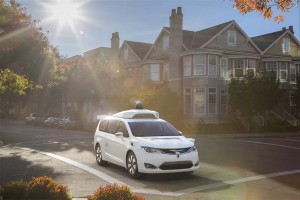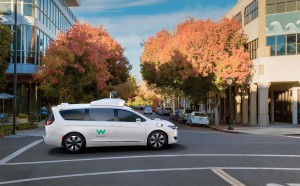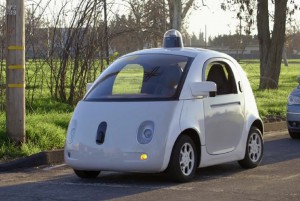Fiat Chrysler Automobiles has finished building 100 minivans that will be used as part of the latest test program by Waymo, the newly renamed autonomous vehicle unit of Google.
Produced at FCA’s assembly plant in Windsor, Ontario, the Chrysler Pacifica Hybrids still must be retrofitted with the sensors and control systems needed to let them operate hands-free. They are expected to go into operation early in 2017, joining the numerous other vehicles Waymo is testing, including bubble like “Google Cars” produced by Detroit’s Rousch Engineering.
“The Pacifica Hybrid will be a great addition to our fully self-driving test fleet. Fiat Chrysler’s product development and manufacturing teams have been agile partners, enabling us to go from program kickoff to full vehicle assembly in just six months,” Waymo CEO John Krafcik said in a statement announcing the latest milestone.
(Google’s autonomous unit becomes Waymo, plans ride-sharing test. Click Here for more.)
Once expected to produce its own vehicles – possibly along the lines of those Google Cars – Krafcik earlier this year stressed that the unit now known as Waymo would prefer to find partners willing to use its autonomous technology.
Slow to the self-driving party, FCA was eager to link up with Google, but both partners have stressed that the relationship is not monogamous. And it is a pre-production venture. There have been no public discussions of putting Waymo’s technology into the retail market using FCA vehicles.
Nonetheless, “Our partnership with Waymo enables FCA to directly address the opportunities and challenges the automotive industry faces as we quickly approach a future where fully self-driving vehicles are very much a part of our daily lives,” said Fiat Chrysler CEO Sergio Marchionne.
(GM launching test of autonomous Chevy Bolt EVs. Click Here for the story.)
Virtually every major automaker now has begun testing autonomous vehicle technology, and most hope to have something in production early in the coming decade. Semi-autonomous systems, such as Tesla’s controversial Autopilot, are already available on the retail market.
But experts caution that there are still plenty of technical challenges to overcome before they can be confident autonomous vehicles can handle any and all of the potential challenges that will face them in daily use.
That’s a key goal for the Waymo-FCA partnership. The project more than doubles the size of the Google unit’s current self-driving test fleet – which has already logged more than 2.3 million miles on public roads. Those Google electric cars and Lexus RX450h hybrids have so far been operating in relatively warm and predictable climates, including Silicon Valley, Austin, suburban Seattle and Phoenix.
The new Pacifica models are expected to go into operation in more demanding conditions, including Detroit. Operating on snow and ice will pose significant challenges for the laser, radar and vision sensors Google’s system relies on.
The announcement comes barely a week after Google’s parent, Alphabet, Inc., officially formed Waymo as a standalone unit. There is speculation it may eventually be sold or spun off entirely.
Whether it will continue to work with FCA after this project remains to be seen. But it appears clear the Euro-American automaker sees the venture as a model for the future.
“As consumers’ transportation needs evolve, strategic collaborations such as this one are vital to promoting a culture of innovation, safety and technology,” said FCA CEO Marchionne.
(Click Here for TDB’s first drive in the new Chrysler Pacifica.)



